- Home
- Alex Scarrow
No Escape Page 13
No Escape Read online
Page 13
“It’s best if you remove your shirt, Jing. There will be some blood.”
He did as she instructed, unbuttoning, then removing the crisp, white top of his navy uniform. He folded it carefully and placed it on a clean part of the floor.
He was wearing a black undershirt beneath. “That’s enough. We just need to get to your arm and shoulder. Now lie down.”
He sat down, carefully examined the floor around him, then lay back.
“Spread your arms out wide.” He did so.
“Jing, I’m going to reach out for you. There’s going to be a little sting as I enter, and that’s it. No more pain after that, I promise. You just relax, OK?”
“Yes, Grace.”
“Jesus Christ!” hissed someone standing directly behind Rex. “Are we really letting this happen to the poor bastard?!”
“Be quiet!” snapped Rex. The observation room quieted down.
They watched Lieutenant Choi lying perfectly still, arms stretched out like da Vinci’s “Vitruvian Man,” his eyes closed, his chest gently falling and rising.
Jesus. Rex had to admire the man’s courage. To even enter the room. Or maybe he’s been brainwashed by her to “join” him?
Rex was not prepared to think beyond this experiment. If Choi did return unharmed and could prove that he was uninfected, then…the same invitation awaited himself.
The containment room was still and quiet. Then, finally, the silence was broken by a wet snapping sound. Rex saw something emerging from the largest and thickest pool of organic material on the floor. A dark, wrinkled membrane, like the desiccated skin on a sun-dried date, had formed over the pool during the last few days. Now, something small seemed to be poking around beneath it. A tiny rip in the membrane suddenly appeared, and a bloody, crablike creature emerged—freshly born.
Once again, the silence in the observation room was broken by the exchange of hushed voices. “We saw those things in Calais and Southampton. Thousands of the bloody little—”
He raised his finger to shut them up.
The creature climbed out of the ripped membrane and began to take little uncertain steps across the white tiled floor toward Choi’s arm, dragging behind its abdomen what appeared to be a fine, sticky thread.
Is that some sort of umbilical cord?
The creature finally reached Choi’s left arm.
“You’ll feel some tickling,” said Grace. “That’s nothing to be afraid of. It’s a messenger, a scout making contact with you.”
The creature’s fine legs and antennae touched Choi’s arm and began gently caressing his skin.
“What’s that thing doing?” asked Rex.
“Lieutenant Choi tells me They are better now at entering us,” replied Captain Xien. “They are more familiar with our biology. So, the process can be less…destructive.”
The answer came with a trickle of bright-red blood that rolled down across Choi’s pale forearm and dripped onto the floor. The creature shifted position, turning delicately around until its abdomen was poised above the breach in his skin, then it lowered itself down, pushing the small bulbous portion of its body through the cut and into his arm. It fidgeted for a few moments, seemingly trying to “back” itself in, then stopped what it was doing, hesitated, and hopped off the arm—minus its abdomen and the umbilical thread. It was just like a bee leaving its stinger behind. The creature scuttled away, its part of the process apparently completed.
“We have made contact with Jing,” said Grace. “It will take a couple of hours now to reach him…on the inside.”
* * *
Jing felt the sting. It was barely a scratch, and as Grace had promised, there was no more pain. He was aware of the cold tiles beneath his bare shoulders, the glare of the fluorescent light in the ceiling directly above him leaching through his closed eyelids and staining his view with a warm amber glow. He watched flecks of micro debris on the surface of his eyes slide gracefully to one side as they avoided direct inspection. He listened to his own breathing, in and out, regular and soothing, the soft fizz of the light above and the quiet hiss of the com speaker, broken every now and then by the rustling of movement or a whispered exchange outside.
Gradually, those sensations began to recede. Time passed.
Time passed.
Time passed…and Jing found himself beginning to wonder if this was what death was like—the gradual descent of awareness, from the outside to the inside, to eventually nothing.
* * *
Jesus Christ, his whole arm’s gone!
Rex was mentally unprepared to deal with what he was seeing with his own eyes. The speed at which the liquefaction process worked was astounding. Within a minute of that small glistening, crablike thing depositing its body into the incision, the skin around it had darkened to a threatening, angry purple. A minute or so more and the discoloration had extended to reach up to the man’s shoulder and down to his elbow. The discolored skin was beginning to glisten wetly in places; sagging dimples were appearing where the tissue beneath the skin was decaying faster than on the surface.
Then came the first gentle ripping as gravity won the battle against surface tension. Like gravy skin parting at the spout of a gravy boat, his skin began to separate. Loops of the flesh around Lieutenant Choi’s arm began to break away and sag from his bones onto the floor.
Unharmed. She promised he’d be unharmed, Rex reassured himself. She’d explained, for their benefit, that Choi was going to be completely subsumed into the virus.
Then returned.
Unharmed.
A full demonstration that entering her world could be done nondestructively.
Ten minutes after that first incision, Rex could see spots of blood soaking through Lieutenant Choi’s trousers. He could see the smart cotton uniform deflating as once-firm flesh became jelly, leaving just the ridges of untouched bone to mark the frame of his body.
Choi’s face was gone. The purpling of his skin had begun at his temples and bloomed outward across his forehead, around his closed eyes, and onto his cheeks. Rex, watching closely, had noticed how the advancing edge of discoloration was led by much fainter leading lines beneath the skin. As both doctors and various experts had speculated, the living host’s arterial system provided a convenient and rapid transport network for the pathogen. Thus, the heart and lungs would be left unaffected until the very end—the cardiovascular system becoming an unwitting conspirator to its own demise.
Half an hour after first contact, Rex noted Jing was no longer breathing.
* * *
Jing had begun to feel frightened. One by one, he’d felt his senses shut down: first his sight, then smell, taste, then hearing. Even the coldness of the observation room’s floor had receded. One by one, his connections to the world were severed until he felt he was a non-corporeal entity, disembodied and floating in darkness.
He had experienced a sensory deprivation tank once before, an enclosed coffin-like container filled with body-temperature water. It had been one part of his training as a junior officer, assessing his ability to remain calm, checking him for claustrophobic tendencies. He and his fellow officer trainees had been left to float in complete silence and darkness for an hour. For some of his colleagues, it had been a disconcerting experience. For Jing, at first, it had been almost pleasant, with nothing to sense, nothing to feel, hear or see, a chance to descend deep into his mind. To meditate.
But toward the end of the exercise, like the others, he’d begun to experience a growing sense of panic at the dilation of time. An hour, they’d all been assured—just one hour, yet each of them afterward had confessed they’d begun to believe a whole morning had passed in there, a day even, that they might have been the one trainee forgotten about as the rest of the group moved on to the next exercise!
Jing was beginning to fear that this floating, silent blackness would be h
is eternity. He wondered how long it would take, existing like this, for the experience of complete sensory denial to drive someone completely mad.
Then…he became aware of something.
A brand-new sense.
A sixth sense that could only be described as halfway between taste and smell. Or maybe an amalgamation of both that added up to more than the sum of its parts. He had a new sensation that seemed to stimulate “understandings.” First a “flavor” that vaguely reminded him of the first sip of morning tea. He recalled a soothing memory of his mother waking him up on home leave. A tender smile and her cool palm against his cheek and the tap of the cup being placed gently on his bedside table.
He instinctively understood that the triggered memory was deliberate. It was a method of communication that preceded a shared language.
Something was greeting him.
Another “flavor”—this time, starch. The smell of his uniform’s stiff collar. The same smell that greeted him every morning as he dressed, buttoned up, and prepared for duty.
He had an instinctive understanding that this was something like, Are you ready.
Then a “flavor” that reminded him of linseed oil, chalk dust, disinfectant, stimulating memories of his first day at school.
He understood that someone was telling him to focus.
To pay attention.
The final “flavor” stimulated a different part of his consciousness.
[h50o-8fch5thj2ha9-e—Jhs9@-hl*se.-I&s89pjje]
It was halfway between hearing an unrecognizable noise and reading a phrase in a foreign language.
It came again, modified slightly…
[ he 5 o 07 c Hn- you$ h r- me—Jing£ 9 @ t ‘s 0me It’shr8ce…] It was like someone was tuning a radio for better reception. The peculiar sensation occurred again. Only this time it made sense.
[Hello, can you hear me, Jing? It’s Grace.]
Chapter 24
Freya and about forty others were being escorted out of the tobacco warehouse. They were all allowed half an hour a day outside in a fenced-off compound that had once been a basketball court. The wheeled doors of the warehouse clattered open, and Freya savored the sunlight on her face as she stepped outside onto the asphalt, warm beneath her feet.
This routine had only been in place for the past week. Somebody, somewhere, presumably Mr. Friedmann, had pulled strings to get them this brief amount of time outdoors. The conditions inside had been getting progressively worse. The toilet areas were being emptied less frequently. The mealtimes were becoming ever more chaotic as less and less food was being brought in by the forklifts. Freya was worried that pretty soon things were going to break down into a brutal version of jungle law: the fittest and strongest shoving their way to the front and taking what they wanted. It wasn’t like that yet inside the vast warehouse, but she could see that if conditions continued to deteriorate, it wouldn’t take long.
She wandered over to the chain-link fence, grabbed the rusting wire for balance, and stretched out her left leg, then her right. This morning, she noticed that her left hip was completely painless, not even the slightest nagging ache.
She’d also noticed her speech getting better, less slurred. She’d been told the symptoms of MS could sometimes appear to plateau for a while, but it was, ultimately, regretfully, a one-way journey.
We can’t reverse this, Freya. The best we can hope to do is manage the rate of degeneration.
She straightened up and looked around, hoping to catch sight of Leon’s dad. He’d come down here most mornings, bringing with him a little discreet contraband food for her and assurances that this appalling state of affairs was going to be over soon. But she couldn’t see any sign of him today.
She looked around at the four sides of the old basketball court. Normally there were about a dozen guards.
This morning, though, there were more of them. A lot more.
She saw three army trucks, led by a Humvee, approaching the waterfront, kicking up dust from the road as they turned off the highway and rattled across gravel toward them.
What’s this, then?
Her heart fluttered hopefully. Maybe Mr. Friedmann had finally managed to talk the president into letting them out. Those trucks would take them into Havana; presumably, there would be some sort of accommodation waiting for them and hopefully something useful for them to do.
The trucks came to a halt, then, one by one, turned and reversed toward the side of the court. She saw Tom Friedmann climb out of the Humvee and walk slowly to stand beside the three backed-up trucks.
Freya crossed the court, heading toward the vehicles. She waved. “Hey! Mr. Friedmann!”
He spotted her and offered her a muted nod. Freya reached the mesh, wound her fingers through and called out again. “Mr. Friedmann! Hey! Are we getting out today?” He looked distracted. An army officer was waiting for instructions from him. Heads nodded briskly, there was an exchange of words, then the officer strode away to pass on whatever orders had been given.
She tried to get his attention again. “Hey! It’s Freya! Are we getting out of here today?”
He bowed his head and looked down at his feet.
Dammit. He heard me. He’s ignoring me!
That didn’t seem like him. She figured he was the kind who’d just come out with it if he had something awkward or difficult to say.
“What’s happening?” she called out again, louder this time.
He remained as he was, still looking down at his own feet.
A voice barked out, and a moment later, the canvas drapes at the back of all three trucks were flung roughly aside. In their shadowed interiors, she could see movement going on—something shining as it was moved forward and into the sunlight.
She saw a bare, tanned forearm. A rolled-up sleeve. A gloved hand holding a fire hose. The gleam of a watch strap. The movement of arms and hands following orders.
“NOW!”
Jets of liquid emerged from all three trucks, arcing out across the court. For a fleeting second, she wondered if they were going to be treated to a cooling shower to wash away several weeks’ worth of sweat and grime. Hardly the most dignified way of getting clean again, but—screw it—about time and more than welcome.
Then she caught the overpowering odor. Thick in the shimmering air and unmistakable.
Gasoline.
She screamed. “OH GOD, NO!”
The gas soaked her, stung her skin, her face. She backed away from the mesh fence as the arcs of liquid swept across the court, soaking everyone and drenching the asphalt. The air was suddenly filled with screaming, everyone realizing, like Freya, what was about to happen.
Freya, shaking, backed into a corner of the court, staring at her soaked hands and arms, feeling her clothes clinging to her skin, her long, dark hair matted, hanging and reeking of gas.
Oh God. No! Not like this. Not like this!
The hoses stopped. But the screaming didn’t. Her voice and everyone else’s pleading, crying, screaming, wailing as one of the marines stepped toward the mesh, produced a twist of paper and set it on fire.
Freya saw Mr. Friedmann turn away, head toward the Humvee, sobbing, not even man enough to witness what he was supervising.
The marine held the twist of paper in his hand until it had caught completely, then pushed it through the mesh and backed quickly away.
Freya’s scream became one long, ragged sound as, almost in slow motion, a wave of blue flame swept across the court like a vengeful ghost, engulfing her and everyone else.
“NO!”
She sat bolt upright in her cot, her scream strangled to a thick, throaty gurgle.
It was dark and very still. The stifling air in the warehouse was thick with the sounds of slumber, deep and even breathing, snores and rumbles. And there, perched on the end of her cot, like some fairytale troll, sa
t Grace.
“Freya,” she said softly. “It’s me.”
Freya was still huffing air in and out of her lungs, like the bellows of blacksmith’s furnace. She was still in shock, still half-immersed in the absolute certainty that she was on fire from head to toe, her skin blistering, bubbling, and sloughing from her bones.
“I saw your nightmare,” said Grace. “It was horrible.” She needed another few seconds to shake off the terror, to pull herself out of the confines of that dream and make sense of the context of this one. Was it another nightmare? Obviously, she was still sleeping.
“Grace?”
“Yes.” Grace smiled. “It is me. I’m here. This is real.”
“Grace,” Freya said again. She looked around. She was still in the warehouse, the air still stank of tobacco, sweat, and feces. “How come you’re here? How…? Where did—”
“I’m inside you, Freya.”
“Inside me?”
“I infected you.” Three words delivered as plainly and as simply as that. It must be a dream, then.
“I want to see Leon,” Freya said. “Can I see Leon, please?”
“Freya, this isn’t a dream. This is real.”
“Uh-huh. Course it is.”
“I infected you.”
“No, you didn’t.”
Grace nodded. “I did.”
“OK then. How? When?”
“On the way down to Southampton.” She leaned forward, reached out for one Freya’s hands. Freya instinctively recoiled and pulled her hand back. “Freya, this is not a dream. This is a construction. Like a mind trick. An illusion. It’s an illusion I’m controlling.”
“You’re…controlling this?”
“Yes. Because I’m inside you. I’m with you.”
“Well, that’s just nuts. This isn’t real!”
It certainly felt real though. Smelled real. Freya tried to remember if she’d ever had a dream where she could actually smell things.
“Freya, please…listen to me. I’ve got something very important to tell you.”
“You…you’re not here! You can’t be here!”

 Day of the Predator
Day of the Predator Ellie Quin Book 3: Beneath the Neon Sky
Ellie Quin Book 3: Beneath the Neon Sky The Mayan Prophecy
The Mayan Prophecy October Skies
October Skies Ellie Quin Episode 4: Ellie Quin in WonderLand (The Ellie Quin Series)
Ellie Quin Episode 4: Ellie Quin in WonderLand (The Ellie Quin Series)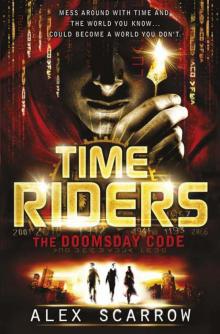 Time Riders
Time Riders Gates of Rome
Gates of Rome Reborn
Reborn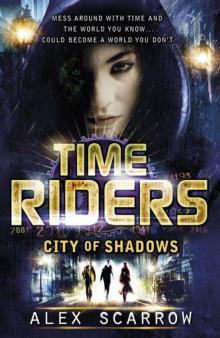 City of Shadows
City of Shadows Ellie Quin Book 2: The World According to Ellie Quin (The Ellie Quin Series)
Ellie Quin Book 2: The World According to Ellie Quin (The Ellie Quin Series) Ellie Quin Episode 5: A Girl Reborn
Ellie Quin Episode 5: A Girl Reborn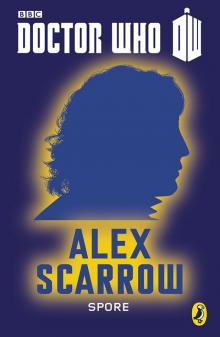 Spore
Spore The Eternal War
The Eternal War Last Light
Last Light Remade
Remade Ellie Quin Book 2: The World According to Ellie Quin
Ellie Quin Book 2: The World According to Ellie Quin Ellie Quin Book 3: Beneath the Neon Sky (The Ellie Quin Series)
Ellie Quin Book 3: Beneath the Neon Sky (The Ellie Quin Series)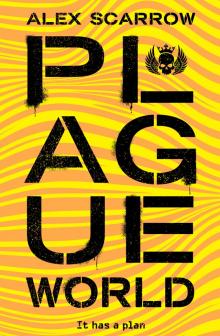 Plague World
Plague World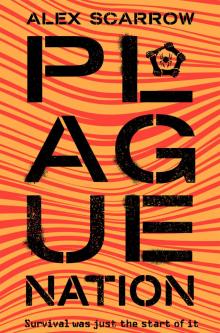 Plague Nation
Plague Nation Ellie Quin Book 01: The Legend of Ellie Quin
Ellie Quin Book 01: The Legend of Ellie Quin Ellie Quin - 04 - Ellie Quin in WonderLand
Ellie Quin - 04 - Ellie Quin in WonderLand No Escape
No Escape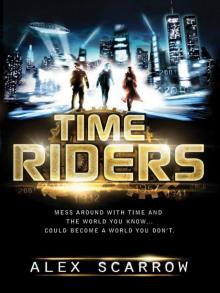 TimeRiders
TimeRiders A Thousand Suns
A Thousand Suns The Candle Man
The Candle Man The Pirate Kings
The Pirate Kings Burning Truth: An Edge-0f-The-Seat British Crime Thriller (DCI BOYD CRIME THRILLERS Book3) (DCI BOYD CRIME SERIES)
Burning Truth: An Edge-0f-The-Seat British Crime Thriller (DCI BOYD CRIME THRILLERS Book3) (DCI BOYD CRIME SERIES) Day of the Predator tr-2
Day of the Predator tr-2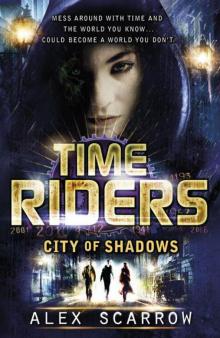 City of Shadows tr-6
City of Shadows tr-6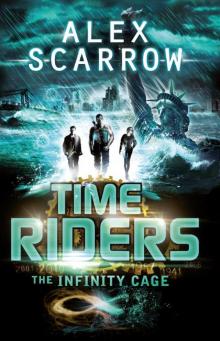 TimeRiders: The Infinity Cage (book 9)
TimeRiders: The Infinity Cage (book 9)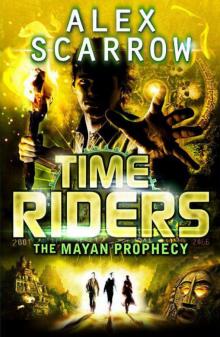 The mayan prophecy (Timeriders # 8)
The mayan prophecy (Timeriders # 8)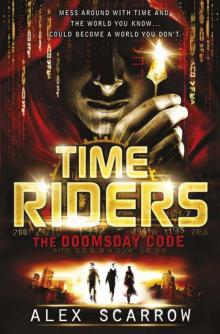 TimeRiders: The Doomsday Code (Book 3)
TimeRiders: The Doomsday Code (Book 3) Gates of Rome tr-5
Gates of Rome tr-5 TimeRiders: The Pirate Kings (Book 7)
TimeRiders: The Pirate Kings (Book 7) TimeRiders: The Mayan Prophecy (Book 8)
TimeRiders: The Mayan Prophecy (Book 8) TimeRiders 05 - Gates of Rome
TimeRiders 05 - Gates of Rome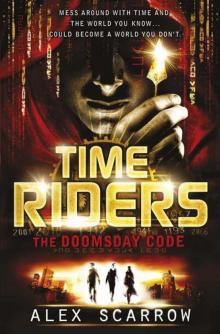 The Doomsday Code tr-3
The Doomsday Code tr-3 The Eternal War tr-4
The Eternal War tr-4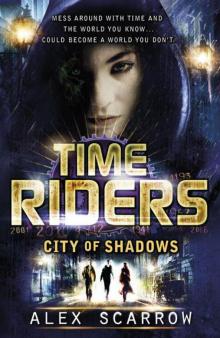 TimeRiders: City of Shadows (Book 6)
TimeRiders: City of Shadows (Book 6)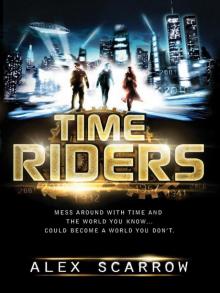 Time Riders tr-1
Time Riders tr-1 Afterlight
Afterlight TimeRiders, Day of the Predator
TimeRiders, Day of the Predator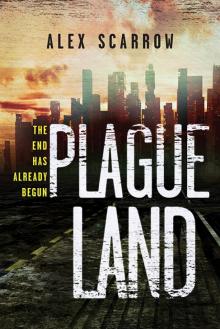 Plague Land Series, Book 1
Plague Land Series, Book 1